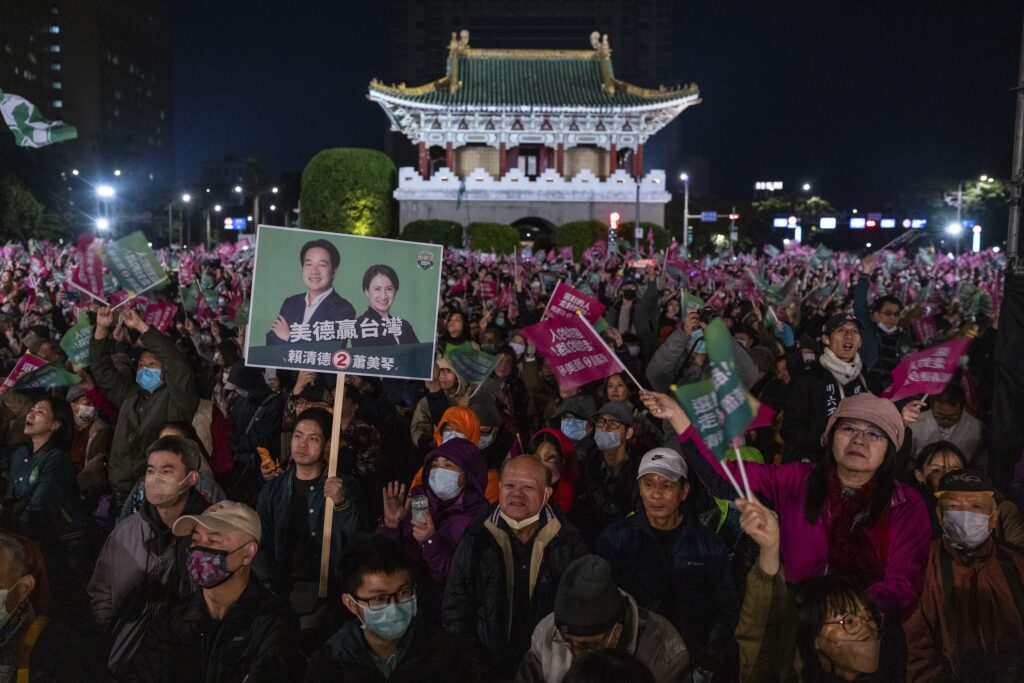Taiwanese Vice President Lai Ching-te closed his campaign for president with an argument that he’s the security candidate in the field despite China’s threat that Taiwan will face “extreme danger” if he wins.
“Each of your ballots will help safeguard Taiwan,” Lai said at an election eve rally in Tainan, a city on Taiwan’s southern coast. “Every vote would help unify our nation and make progress on the road.”
As the heir-apparent to term-limited Taiwanese President Tsai Ing-wen, Lai finds himself in a tighter-than-expected campaign against Hou Yu-ih, a leading opposition candidate who hails from a party with a pro-Beijing reputation, and an upstart third-party. The intra-Taiwanese debate has been haunted by an array of Chinese Communist pressure tactics aimed at sinking Lai’s candidacy, even as the Taiwanese rivals reflect a growing foreign policy consensus in the Taiwanese electorate.
“The candidates don’t differ that much in terms of their foreign policy positions,” Dr. Lily McElwee, deputy director of China studies at the Center for Strategic and International Studies. “All of the candidates are suggesting, ‘We stay with the status quo.’ All of the candidates are suggesting, ‘We invest in Taiwan’s defense to deter China.’ But all of the candidates are also — and I think this is maybe where they differ on the margin — suggesting various levels of communication and cooperation with China, with Beijing.”
As polls opened at 8 a.m. Saturday morning local time, the Taiwanese voters are set to choose between those options under the voluble threat of conflict with China, should they choose to promote Tsai’s longtime ally.
“The People’s Liberation Army is on high vigilance at all times and will take all necessary measures to resolutely crush any form of secessionist designs for ‘Taiwan independence’ and to firmly defend the sovereignty and territorial integrity of the country,” Col. Zhang Xiaogang, a Chinese defense ministry spokesman, said Friday.
That rhetoric amounts to a condemnation of Lai’s Democratic Progressive Party, which originated as a pro-independence movement that dissented from the martial law regime that Republic of China leader Chiang Kai-shek established on the island after the Chinese Communist Party overthrew his nationalist Kuomintang government.
Taiwan transitioned to democracy after the Cold War, producing a political system dominated by two parties, one of which is perceived, in Beijing at least, as more willing to submit eventually to China’s claims to sovereignty over the island.
“‘Taiwan independence’ is the biggest threat to cross-Strait peace and stability and is doomed to failure,” Chinese Foreign Ministry spokeswoman Mao Ning said Friday. “The elections of the Taiwan region are China’s internal affairs. Regardless of the result, it will not change the basic fact that Taiwan is part of China and there is only one China in the world.”

Chinese Communist officials have ramped up military activity around Taiwan since August 2022, when then-House Speaker Nancy Pelosi (D-CA) visited Taipei over Beijing’s objections. And they have used military gestures and economic pressure to signal their preference to raise the perceived stakes of a victory by Lai.
“I sincerely hope the majority of Taiwan compatriots recognize the extreme harm of the DPP’s ‘Taiwan independence’ line and the extreme danger of Lai Ching-te’s triggering of cross-Strait confrontation and conflict, and to make the right choice at the crossroads of cross-Strait relations,” China’s Taiwan Affairs Office said.
China’s threats have shaped the debate to such an extent that Taiwanese citizens at a KMT rally chanted “We want peace, not war” to voice their opposition to the Lai.
“Under the DPP government, we see the status quo that is on the verge of war,” Hou Yu-ih said during a December 30 debate, according to a TaiwanPlus News interpreter. “We need the KMT to stabilize the situation across the Taiwan Strait so that we can [be] pro-the U.S. and be friendly with China.”
Chinese Communist relations with Taiwan have been strained in recent years as Tsai has insisted that any negotiations over the status of the island democracy must be held “on the basis of equality, instead of using suppression and intimidation to get Taiwanese to submit.” Hou argues that “interaction will lead to de-escalation,” but he felt obliged to promise this week that he would not discuss “the unification issue” with Chinese Communist officials if elected.
CLICK HERE TO READ MORE FROM THE WASHINGTON EXAMINER
Lai made an emphatic, and popular, statement of his strategic orientation when he tapped Taiwan’s top envoy to the United States, Hsiao Bi-khim, to return from Washington and run for vice president on his ticket.
“Policymakers in the United States are assessing that they can work with any of these candidates,” McElwee said. “[Lai] will continue President Tsai’s pretty pragmatic stance of not declaring independence. So … there’s not a huge amount of daylight between the policies of each party toward cross-strait relations and foreign policy more broadly.”
